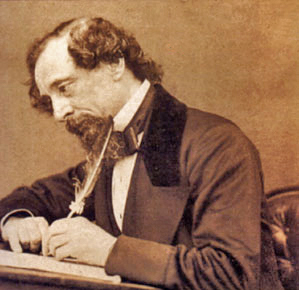
“… As much mud in the streets, as if the waters had but newly retired from the face of the earth, and it would not be wonderful to meet a Megalosaurus, forty feet long or so, waddling like an elephantine lizard up Holborn Hill. Smoke lowering down from chimney-pots, making a soft black drizzle, with flakes of soot in it as big as full grown snow-flakes – gone into mourning, one might imagine, for the death of the sun….
“Fog everywhere. Fog up the river, where it flows among green aits and meadows; fog down the river, where it rolls defiled among the tiers of shipping, and the waterside pollutions of a great (and dirty) city. Fog on the Essex marshes, fog on the Kentish heights. Fog creeping into the cabooses of collier-brigs; fog lying out on the yards, and hovering in the rigging of great ships; fog drooping on the gunwhales of barges and small ships….. Chance people on the bridges peeping over the parapets into a nether sky of fog, with fog all around them, as if they were up in a balloon, and hanging in the misty clouds.”
These two paragraphs are excerpts from Dickens’ description of London on a November morning. How much bleaker can you get? Actually it’s the beginning of his novel, Bleak House.
This was the book that my literacy students wanted to read when I was teaching a few years ago. I was nervous about it beforehand. But I needn’t have been. I started off reading it myself while they followed the words with their fingers. And they were hooked by this description on the very first page. Such were the power of his words on people who had most likely never read any book before, let alone a classic tome of 989 pages in small print.
You can’t interest a publisher in a book like that these days. You don’t really set the scene like this. You have to get straight into the action, so we’re told. But every so often I take out his books and marvel at these pages of description, and how he brings it all alive in my head. His use of repetition is particularly effective.
He does it again at the start of Little Dorrit, another of my favourites. Here the book begins with a description of Marseille on a blazing hot day. The word he repeats is ‘stare’, and I take it to mean glare. Nothing is glaring; it’s all staring, and it’s really effective – makes you want to loosen whatever clothes you are wearing.
And there is that wonderful, spooky description of the graveyard early in Great Expectations. (I haven’t got that one to hand at present. It must be packed in one of the boxes ready for our move.)
There are things to criticise in his books, as well as other aspects to demonstrate his mastery, but it’s way he uses descriptive language that is most memorable for me. What about you?



 Original Articles. Constant-Content.
Original Articles. Constant-Content.
5 comments:
Hello Jean,
It must have been fun teaching literature. I teach chemistry,lol.
Sometimes I like vivid, long descriptions, especially if I have never been to the place, but at times , I want short, snappy ones.
I know of one writer -Brady Frost- who does a very good description of scenes , etc. You may want to visit his site:
http:huntingthemuse.com
It's sad to think that editors tell us what we 'like' to read. You've just proved them wrong!
I've never been a big fan of Dickens, though I do appreciate that his writing is some of the best English Literature has to offer.
Great Expectations, starring John Mills, is however, one of my all time favorite films.
I particularly love the second passage ... very poetic. I read a lot of Dickens when I was younger, and this makes me want to revisit him.
Jena - you're right, of course. We do want different things at different times. Thanks for that link. I'll poodle over there.
Lily - Cheers. I never thought of that.
Jon - He was, of course, required reading when I was at school all those years ago. That actually put a lot of people off. It was a long time before I tried him again. Great Expectations was our GCE text and I saw the film for the first time then. As I remember it was really faithful to the book.
Francis - I'm really glad if this post has inspired you to read him again.
Post a Comment